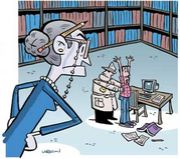May 5, 2006
BOOKS OF THE TIMES | 'THE BOOK OF LOST BOOKS'
A Literary Archaeologist Digs for Missing Treasures
By MICHIKO KAKUTANI
THE BOOK OF LOST BOOKS
An Incomplete History of All the Great Books You'll Never Read.
By Stuart Kelly.
344 pp. Random House. $24.95.
LOST: burned, misplaced, abandoned, suppressed, never finished, never started.
The books in Stuart Kelly's clever and highly entertaining new book are works of literature that have somehow been lost to posterity: Homer's "Margites," a humorous epic about a fool, who, in Plato's words, "knew many things, but all badly"; the Arthurian epics contemplated by both Dryden and Milton but never written; Laurence Sterne's never completed "Sentimental Journey Through France and Italy," which concludes with one of the most famous unfinished sentences in literary history ("So that when I stretch'd out my hand, I caught hold of the Fille de Chambre's —") ; Lord Byron's supposedly explosive "Memoirs," which his publisher, executor and biographer had burned because, as one critic put it, they were "fit only for the brothel and would have damned" the poet "to everlasting infamy"; the novel, provisionally titled "Double Exposure" or "Double Take," that Sylvia Plath was reportedly working on before her suicide in 1963.
As Mr. Kelly notes, "Loss is not an anomaly, or a deviation, or an exception," it's "the norm," and his inventory of missing books is a many-splendored thing, filled with classics gone missing and wildly ambitious projects never realized. We are reminded for instance of how little from antiquity has survived: we have only 7 of the more than 80 plays Aeschylus wrote, only 7 of Sophocles' 120 and only 18 of more than 90 by Euripides.
Aeschylus, whose supposed cause of death must surely rank as one of the strangest on record — an eagle, Mr. Kelly informs us, dropped a tortoise on his head, apparently mistaking his bald pate for a rock — would garner great fame in the ancient world, and the sole copy of his complete works came to occupy a privileged place in the celebrated library of Alexandria in Egypt; that copy was destroyed, along with thousands of other precious volumes, when that library went up in flames.
In the case of the comic playwright Menander, the loss of his writing was probably a good career move. Although the last known manuscripts of his work disappeared in Constantinople centuries ago, he had been hailed for his realism and his literary elegance by the likes of Aristophanes and Plutarch, and over the years, Mr. Kelly observes, his "fame grew and grew." That is, until fragments of his work turned up in an Egyptian excavation in 1905, and decades later one of his plays was pieced together, translated and staged. The reaction was less than enthusiastic, with Erich Segal, the classicist (better known as the author of "Love Story"), declaring that Menander had been revealed to be "a suburban Euripides."
As Mr. Kelly sees it, Menander's plays aren't the only works best lost to history's dustbin. Had Edward Gibbon pursued his original plan to write "The History of the Liberty of the Swiss," he might never have gone on to write the work that made him famous, "The History of the Decline and Fall of the Roman Empire."
More debatable is Mr. Kelly's suggestion that the loss of a suitcase containing the young Ernest Hemingway's apprentice writings — his first wife, Hadley, was transporting his possessions to Switzerland in 1922, when the valise was apparently stolen — was actually a fortuitous event that forced him to develop his famous style and write the books he was capable of writing.
Other authors were determined to destroy works they considered flawed, too personal or not up to snuff. Although the first part of Gogol's masterpiece "Dead Souls" was published to great acclaim, he would succumb to a growing religious mania in later years and would burn portions of Part 2 — not once but twice. Mr. Kelly writes that Alexander Pope's hilarious mock-epic "The Dunciad" exists thanks to Jonathan Swift, who "snatched the first draft from the fire and persuaded Pope to continue." And Kafka's friend Max Brod famously defied Kafka's directive that all his work be burned upon his death, thereby insuring that classics like "The Trial" and "The Castle" saw the light of day.
Mr. Kelly recounts such stories in chatty, opinionated chapters that recall John Aubrey's gossipy "Brief Lives" and Lytton Strachey's "Eminent Victorians." Some of his observations are overly glib: he patronizingly writes that Dickens, in his last (unfinished) book "The Mystery of Edwin Drood," "sets up a series of resonances and ambiguities that seem comparable to the films of David Lynch."
Some of his entries deal only in a tangential fashion with the subject of lost books. For instance he retells the story of Coleridge's famous unfinished poem "Kubla Khan": how it was written in an opium-induced reverie that was interrupted by the arrival of a visitor ("a person on business from Porlock"). And he focuses his chapter on T. S. Eliot around a Harvard alumni publication note about the poet's having written a work called "Literature and Export Trade" — something Eliot himself admitted was probably a "small leg-pull of my own" or the result of some misunderstanding on the part of the alumni-report editors.
All in all, though, Mr. Kelly has succeeded in writing a charming and diverting book, a Borgesian library of books lost or missing or never written.
http://
BOOKS OF THE TIMES | 'THE BOOK OF LOST BOOKS'
A Literary Archaeologist Digs for Missing Treasures
By MICHIKO KAKUTANI
THE BOOK OF LOST BOOKS
An Incomplete History of All the Great Books You'll Never Read.
By Stuart Kelly.
344 pp. Random House. $24.95.
LOST: burned, misplaced, abandoned, suppressed, never finished, never started.
The books in Stuart Kelly's clever and highly entertaining new book are works of literature that have somehow been lost to posterity: Homer's "Margites," a humorous epic about a fool, who, in Plato's words, "knew many things, but all badly"; the Arthurian epics contemplated by both Dryden and Milton but never written; Laurence Sterne's never completed "Sentimental Journey Through France and Italy," which concludes with one of the most famous unfinished sentences in literary history ("So that when I stretch'd out my hand, I caught hold of the Fille de Chambre's —") ; Lord Byron's supposedly explosive "Memoirs," which his publisher, executor and biographer had burned because, as one critic put it, they were "fit only for the brothel and would have damned" the poet "to everlasting infamy"; the novel, provisionally titled "Double Exposure" or "Double Take," that Sylvia Plath was reportedly working on before her suicide in 1963.
As Mr. Kelly notes, "Loss is not an anomaly, or a deviation, or an exception," it's "the norm," and his inventory of missing books is a many-splendored thing, filled with classics gone missing and wildly ambitious projects never realized. We are reminded for instance of how little from antiquity has survived: we have only 7 of the more than 80 plays Aeschylus wrote, only 7 of Sophocles' 120 and only 18 of more than 90 by Euripides.
Aeschylus, whose supposed cause of death must surely rank as one of the strangest on record — an eagle, Mr. Kelly informs us, dropped a tortoise on his head, apparently mistaking his bald pate for a rock — would garner great fame in the ancient world, and the sole copy of his complete works came to occupy a privileged place in the celebrated library of Alexandria in Egypt; that copy was destroyed, along with thousands of other precious volumes, when that library went up in flames.
In the case of the comic playwright Menander, the loss of his writing was probably a good career move. Although the last known manuscripts of his work disappeared in Constantinople centuries ago, he had been hailed for his realism and his literary elegance by the likes of Aristophanes and Plutarch, and over the years, Mr. Kelly observes, his "fame grew and grew." That is, until fragments of his work turned up in an Egyptian excavation in 1905, and decades later one of his plays was pieced together, translated and staged. The reaction was less than enthusiastic, with Erich Segal, the classicist (better known as the author of "Love Story"), declaring that Menander had been revealed to be "a suburban Euripides."
As Mr. Kelly sees it, Menander's plays aren't the only works best lost to history's dustbin. Had Edward Gibbon pursued his original plan to write "The History of the Liberty of the Swiss," he might never have gone on to write the work that made him famous, "The History of the Decline and Fall of the Roman Empire."
More debatable is Mr. Kelly's suggestion that the loss of a suitcase containing the young Ernest Hemingway's apprentice writings — his first wife, Hadley, was transporting his possessions to Switzerland in 1922, when the valise was apparently stolen — was actually a fortuitous event that forced him to develop his famous style and write the books he was capable of writing.
Other authors were determined to destroy works they considered flawed, too personal or not up to snuff. Although the first part of Gogol's masterpiece "Dead Souls" was published to great acclaim, he would succumb to a growing religious mania in later years and would burn portions of Part 2 — not once but twice. Mr. Kelly writes that Alexander Pope's hilarious mock-epic "The Dunciad" exists thanks to Jonathan Swift, who "snatched the first draft from the fire and persuaded Pope to continue." And Kafka's friend Max Brod famously defied Kafka's directive that all his work be burned upon his death, thereby insuring that classics like "The Trial" and "The Castle" saw the light of day.
Mr. Kelly recounts such stories in chatty, opinionated chapters that recall John Aubrey's gossipy "Brief Lives" and Lytton Strachey's "Eminent Victorians." Some of his observations are overly glib: he patronizingly writes that Dickens, in his last (unfinished) book "The Mystery of Edwin Drood," "sets up a series of resonances and ambiguities that seem comparable to the films of David Lynch."
Some of his entries deal only in a tangential fashion with the subject of lost books. For instance he retells the story of Coleridge's famous unfinished poem "Kubla Khan": how it was written in an opium-induced reverie that was interrupted by the arrival of a visitor ("a person on business from Porlock"). And he focuses his chapter on T. S. Eliot around a Harvard alumni publication note about the poet's having written a work called "Literature and Export Trade" — something Eliot himself admitted was probably a "small leg-pull of my own" or the result of some misunderstanding on the part of the alumni-report editors.
All in all, though, Mr. Kelly has succeeded in writing a charming and diverting book, a Borgesian library of books lost or missing or never written.
http://
|
|
|
|
コメント(1)
この本、私は買いです♪
何らかの理由で、失われてしまい、後世の人たちが読むことが出来なくなった本についての本だそうです。
失われた本は例えば……、
?バイロンの、暴露本と思われる「Memoirs」のように、(後の批評家の説明によると)「せいぜいボロ屋がお似合いで、もしこんな作品を残したら、バイロンの名を永遠に汚すことになる」という理由から、彼の出版人や遺言執行人、伝記作家たちが燃やしてしまった? 作品。
あるいは、アレキサンドリア図書館がローマ軍の攻撃で破壊されたときに、一緒に灰になってしまった悲劇作家アイスキュロスの作品。 ところで、アイスキュロスさんて、鷲が彼の禿げ頭を岩と間違えて落とした陸ガメ(中身を食べるため)に当たって亡くなったとか? 本当なんでしょうか? Wikipediaにも書いてありましたが。。信じるのが難しい話だ。
一方ギリシアの喜劇作家メナンドロスの場合は失われたと思われていた「傑作」が今から約100年前に出てきて人目にさらされた結果、実は大したこと無かったということが判明。‘田舎者のエウリピデス’なんていう風に評価が下がったそうです。
また、ある本の構想が実現されなかったために、生まれた作品もあるそうです。著者が言うにはエドワード・ギボンの「ローマ帝国衰亡史」は「The history of the liberty of the Swiss」が企画倒れになったから書けたのだそうです。(なんでスイスなんだろうと思ったら、カソリックに改宗しそうになったギボンにビビッた父親がスイスに勉強させに送り込んだんですね)。
ともかく本書は、?傑作?という評価を失った作品も含め、不運にも消失してしまった本、わざと破棄された本、構想だけでぽしゃった本、危うく失われずに済んだ作品などを色々集めているとのこと。
Kakutaniさんは触れてませんが、著者はエジンバラ在住の批評家で、Telegraphの書評によると、15歳のときにどれだけ多くの文学作品が失われたかということを知ってショックを受け、それから‘失われた本’調べを始めたそうです。
字数制限のせいもあるでしょうが、こちらのSunday Times(イギリス紙)の方がこの本の魅力をうまく伝えている感じです。批判も腑に落ちるし。評者は戦争ドラマで有名な小説家だそうです。
http://www.timesonline.co.uk/article/0,,2102-1747364,00.html
何らかの理由で、失われてしまい、後世の人たちが読むことが出来なくなった本についての本だそうです。
失われた本は例えば……、
?バイロンの、暴露本と思われる「Memoirs」のように、(後の批評家の説明によると)「せいぜいボロ屋がお似合いで、もしこんな作品を残したら、バイロンの名を永遠に汚すことになる」という理由から、彼の出版人や遺言執行人、伝記作家たちが燃やしてしまった? 作品。
あるいは、アレキサンドリア図書館がローマ軍の攻撃で破壊されたときに、一緒に灰になってしまった悲劇作家アイスキュロスの作品。 ところで、アイスキュロスさんて、鷲が彼の禿げ頭を岩と間違えて落とした陸ガメ(中身を食べるため)に当たって亡くなったとか? 本当なんでしょうか? Wikipediaにも書いてありましたが。。信じるのが難しい話だ。
一方ギリシアの喜劇作家メナンドロスの場合は失われたと思われていた「傑作」が今から約100年前に出てきて人目にさらされた結果、実は大したこと無かったということが判明。‘田舎者のエウリピデス’なんていう風に評価が下がったそうです。
また、ある本の構想が実現されなかったために、生まれた作品もあるそうです。著者が言うにはエドワード・ギボンの「ローマ帝国衰亡史」は「The history of the liberty of the Swiss」が企画倒れになったから書けたのだそうです。(なんでスイスなんだろうと思ったら、カソリックに改宗しそうになったギボンにビビッた父親がスイスに勉強させに送り込んだんですね)。
ともかく本書は、?傑作?という評価を失った作品も含め、不運にも消失してしまった本、わざと破棄された本、構想だけでぽしゃった本、危うく失われずに済んだ作品などを色々集めているとのこと。
Kakutaniさんは触れてませんが、著者はエジンバラ在住の批評家で、Telegraphの書評によると、15歳のときにどれだけ多くの文学作品が失われたかということを知ってショックを受け、それから‘失われた本’調べを始めたそうです。
字数制限のせいもあるでしょうが、こちらのSunday Times(イギリス紙)の方がこの本の魅力をうまく伝えている感じです。批判も腑に落ちるし。評者は戦争ドラマで有名な小説家だそうです。
http://www.timesonline.co.uk/article/0,,2102-1747364,00.html
- mixiユーザー
- ログインしてコメントしよう!
|
|
|
|
Michiko Kakutani 更新情報
-
最新のイベント
-
まだ何もありません
-
-
最新のアンケート
-
まだ何もありません
-
Michiko Kakutaniのメンバーはこんなコミュニティにも参加しています
人気コミュニティランキング
- 1位
- ハレプロ セッション♪
- 453人
- 2位
- mixi バスケ部
- 37784人
- 3位
- 【ハレプロJ】セッション
- 269人
























